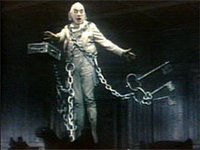What comes to mind when you hear of "Ebenezer?" I think also of "Ichabod" and "Ishmael".
What are these, names? Yes. These are names.
But who bear these nomen? What is their meaning? From whence came they and wither do they go?
I venture in these next installments to discuss my brief thoughts on these personages so-named and what their monikers impose on my Christmas preparations.
***************
What think ye of Ebenezer? I think of remembering . . . and forgetting.

Do you remember the first time you heard "Ebenezer?" More than likely, you first heard the name about this very time of year. Charles Dickens has introduced us to a name that embodies the cold, one bent and set in his ways-a very old man, one Ebenezer Scrooge. He is most remembered because he has forgotten and because he has forgotten, he became someone he had not planned to be.
We meet him at the bottom of his deep forgetfulness, a place so dark and isolated that it takes the visit from his recent past to get his recollection working again. Dickens then brings to Ebenezer three ghosts to help him remember who he once was, the choices he made to become who he is and what end he will meet should he continue on the path he has chosen. When Marley unties his jaw that he may speak in warning to his former
partner Scrooge, I imagine his mouth falling open not so much due to the decay of his own corpse but out of shock that he was sent to speak and gaze upon, in the words of Mark Twain, "the most deadest man ever seen alive. "

What a miserable, horrible personal hell one gains in forgetting what is most important. And the hell is not so much the act of forgetting-what is forgotten is that life is at hand! Rescue is near! This one treasure is what Dickens hopes his readers will remember! Help and victory is what Christmas is about. Do not scrooge away the reality of the nearness of help! Mere nodding the head at salvation is to miser it! Knowing it is there and not act upon it is to forge one's own chains of distress to be worn in the bottomless pits of hell.
And what, pray, is "Ebenezer?" Ebenezer is an act of remembrance and the place of a battle. In days of old when God's people were bold, the great hairy and black-maned sea-people of malformed giants fell at the feet of the small and weak shepherding farming people of the Promised Land. Read the news in 1 Samuel 7:10-17. One scholar explains: "When the Philistines learned of the assembly, they attacked Israel at Mizpah but the Lord, in a mighty demonstration of power (by thunder), defeated them. In commemoration of this great triumph Samuel erected on the site between Mizpah and Shen (whose location is unknown), a monument which he called Ebenezer, literally, the "stone of [God's] help." This apparently ended Philistine occupation of Israelite soil though the Philistines came later time and time again to harass Israel (13:5; etc.)." [Walvoord, J. F., Zuck, R. B., & Dallas Theological Seminary. 1983-c1985. The Bible knowledge commentary : An exposition of the scriptures. Victor Books: Wheaton, IL]
Christmas erects a great Ebenezer, a bright shining gem on the one side and the dull grinder on the other --a stone of remembering (O, sweet hymn of joy!) and a stone over which men stumble or under which be swiftly and completely crushed.
Dickens shows us what being crushed and what one looks like when God's power to route the enemy and His people are saved. One who in his autonomy was free to miss love and hence, mis-love; or he is overcome by love, swept over by the amazing demonstration of God in his incarnation, transfiguration, glorification, exaltation and assumption--the whole of tge Christmas story.
Like a beat-up old instrument old Ebenezer sat in the dark, night after night, sucking gruel from the end of a dirty silver spoon. The chords of his heart without tune or key lay limp and still, the mute locked firmly across the bridge of his heart to muffle any strum or bow. It was the bells. The bells, bells, bells! The tinkling of the silver bells that drive one man to madness and shaking Ebenezer from his own, announcing the arrival of consecutive warnings found in the tolling of the hours and announcing the dawn.
How do we know he was crushed? How do we know he was saved? No sooner had the sun come up, he was caused to remember love. He loved the schoolboy with the shining morning face creeping with his errand from the butcher. He loved his nephews who loved the orphans. He withdrew his hand from his pocket and found love for both fortunate and unfortunate. He abandoned his castle for the East End of London, where the people really livee. He loved not his money, but a fully attended table by ones both great and tiny. He acted as man forgiven. Don't forget that.



